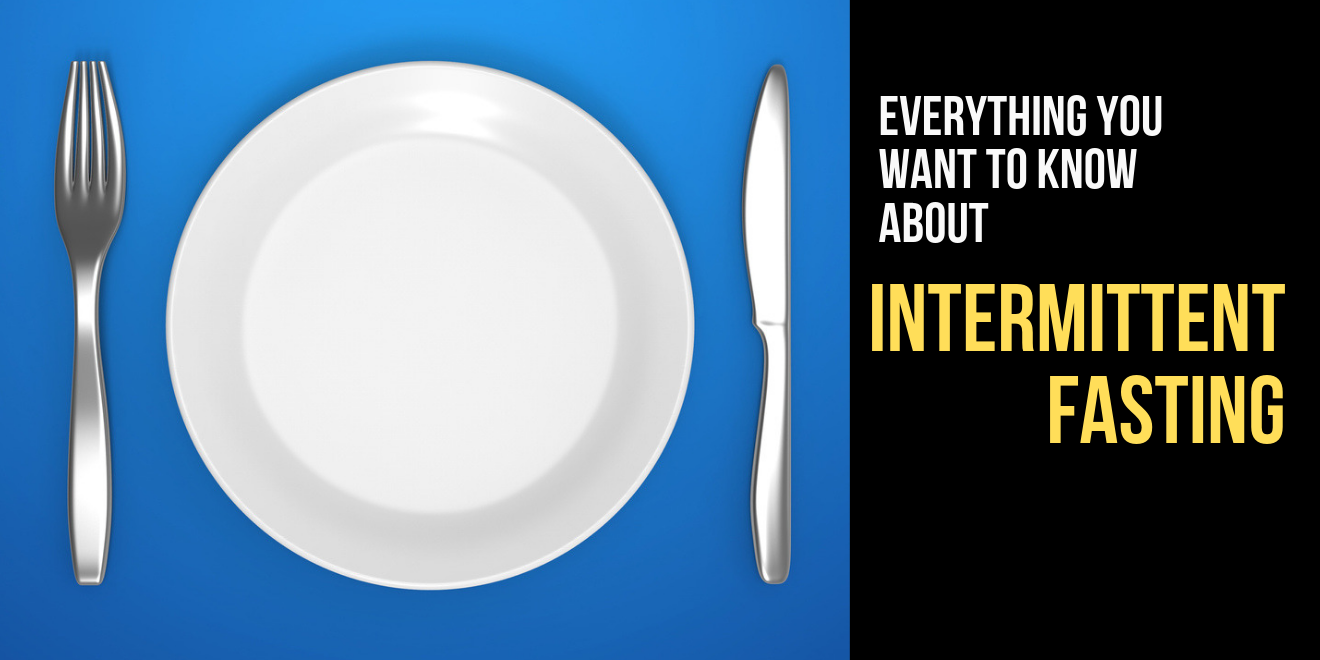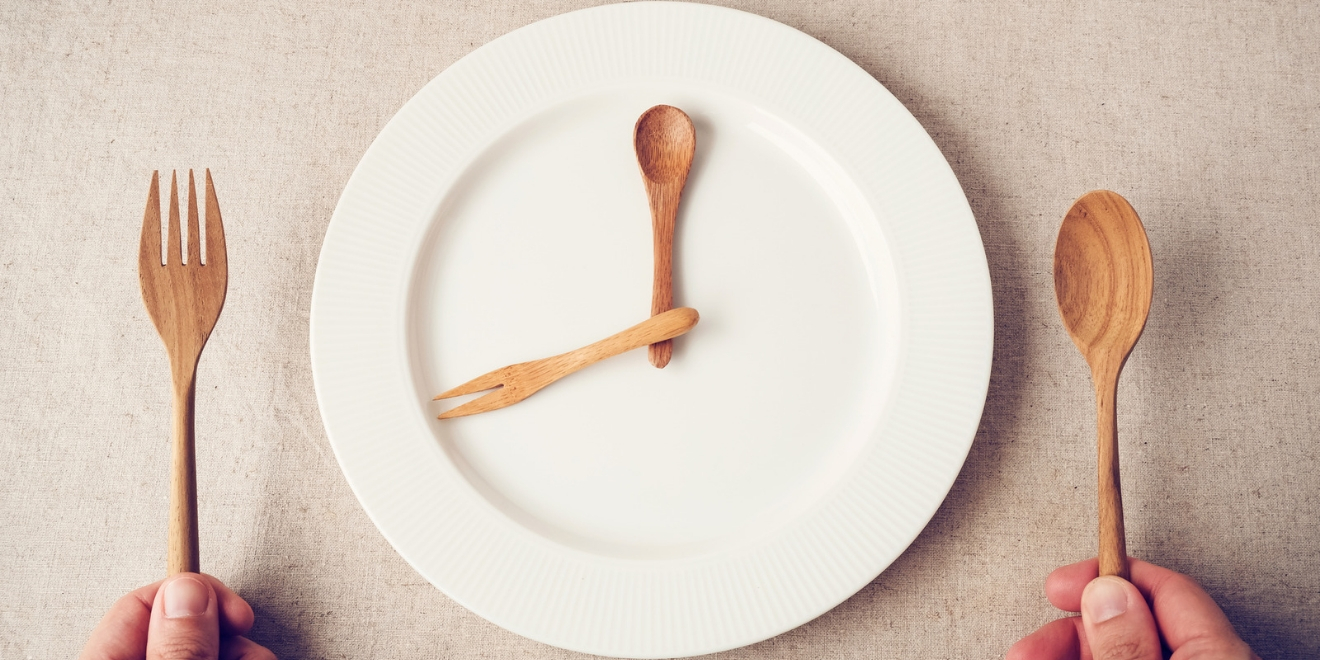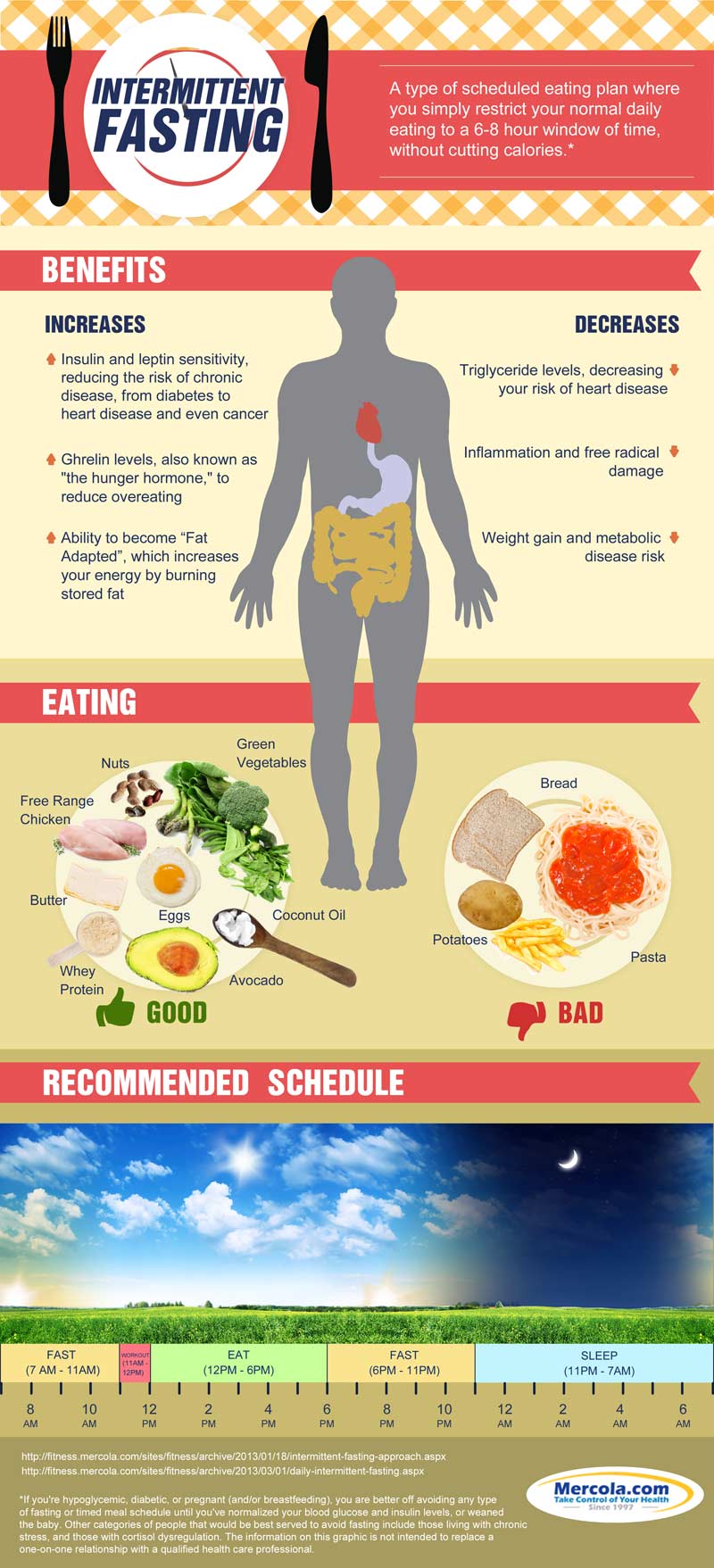All You Need to Know About Intermittent Fasting

Intermittent fasting does not describe a specific form of typical fasting. The intermittent fasting (also called interval fasting), however, denotes a certain eating rhythm.
Compared to actual fasting you do eat during intermittent fasting, but only eat at certain times and especially only at certain intervals. You switch between periods of eating and periods of fasting. This reduces the risks of age-related illnesses, making it easier to lose weight and allowing you to live longer.

For us modern humans it is normal to have a continuous food supply available. After all, at the supermarket, there is always something our heart desires - and the offers are abundant.
Of course, this was not the case for our ancestors who lived mainly as hunters. Before humans became sedentary and learned to cultivate agriculture and livestock, there were days when no food was available.
That sounds pretty dramatic. But these involuntary fast days did not do any harm. On the contrary. They relieved the organism and made it more resistant.
Although overnutrition is known to promote cardiovascular disease and has been implicated in increased rates of disease and death, many people find it difficult to control or even reduce their food intake.
For this reason, the diet of our ancestors has again become the focus of research. One would like to find out whether health-promoting effects of dietetic lifestyles are possible even without reduced food intake.
Various studies conclude that only an alternating rhythm in food intake can minimize cardiovascular risk factors, protect against degenerative diseases of the nervous system and improve health in many ways - and this alternating rhythm in food intake is called intermittent fasting.
The implementation of intermittent fasting is very easy. Periods of normal food intake are followed by periods of fasting (not eating at all).
There are two basic forms of intermittent fasting, which in turn allow numerous variations.
For example, intermittent fasting could be done by fasting one day a week, so eating nothing. Some people also take two fast days a week, so they fast every Monday and Thursday, for example. Others eat and fast in a 24-hour shift.
The latter variant is, of course, the most intense form of intermittent fasting. You eat for one day, the next day you don't eat anything at all. To cover the need for liquids on the days of fasting serve water and unsweetened teas.
To achieve the desired effect such as weight loss or health improvement, it makes sense to use the intermittent fast days in the shortest possible time intervals.
This rhythm should be maintained until the desired fasting goals are achieved. If you have reached the desired weight, you feel better or the blood work got better, you can start reducing the fasting days. But you can also continue, nothing speaking against that.

Intermittent fasting can also be done daily, by fasting every day for 16, 18 or even 20 hours.
Especially beginners start with this variant because it's easier and doesn't require as much change. You do not have to forego solid food for a whole day, but you can eat for 8, 6 or 4 hours, the rest of the time you do not eat any calorie-containing drinks or food.
Of course, you should not eat permanently throughout these 4 to 6 hours, but eat two meals and in any case avoid overeating.
For example, if you want to eat for 6 hours and fast for 18 hours, a daily routine might look like this: You have the first meal (a late breakfast or an early lunch) at 11 am and dinner at 4 pm. So you fast from about 17 clocks (end of the second meal) until the next day at 11 clocks.
Of course, meals should not contain too much sugar or other isolated carbohydrates (white flour, white rice). Then the blood sugar and insulin levels remain low and the body gains more energy from burning fat.
All in all, your diet should stay as healthy as possible, intermittent fasting does not mean eating whatever you like.
After the first meal is also a good time to take supplements such as antioxidants and vitamins (vitamin C, vitamin B complex, vitamin B 12, astaxanthin, OPC, etc.), amino acids and phytochemicals (such as nettle leaf powder, barley grass powder or whatever you need)
Through the meal, the metabolism is stimulated, and the micronutrients can now be well absorbed by the intestine.
However, since the body was not burdened with a heavy and unhealthy meal, the active ingredients can undisturbed detoxify the cells and tissues and repair damage to cell membranes and genetic material.
If you want to intensify this entire process, you can reduce the period of food intake to less hours per day - until you have two meals.
If it is a dietary supplement that you should take on a fasting diet, of course, take it BEFORE the first meal and then wait 10 to 30 minutes to eat - or proceed as recommended by the manufacturer.

At first, intermittent fasting is unfamiliar to many people, especially those who are constantly snacking or constantly sipping on a drink. They think they are hungry. But it's often not hunger, but appetite.
Even a blood sugar level that has gotten out of hand can initially trigger feelings of hunger. This happens especially if someone in the past used to have frequent meals or snacks with isolated carbohydrates (sweet bars, sweet drinks, rolls, biscuits, sweet particles, etc.).
Consuming these isolated carbohydrates causes a rapid increase in blood sugar and insulin levels.
Hunger is the result, as the blood sugar level drops again soon and the body signals the desire for sugar replenishment.
However, just by intermittent fasting and nutrition without isolated carbohydrates, the organism learns again to regulate its blood sugar levels, so that even several hours without food can be overcome without any stomach growling or feeling weak.
Yes, the food breaks will in the future develop into phases with the highest physical and mental performance.
Athletes can of course also practice intermittent fasting. It can increase performance and improve overall health.
If you want to further support the anabolic processes and optimize the personal protein supply, then high-quality pure plant proteins (lupine protein, rice protein, hemp protein, etc.) can improve the synthesis of endogenous proteins.
This not only strengthens the muscles but also the collagenous connective tissue, which is responsible for the firmness of the skin and tissues.
The vegetable proteins are consumed as a shake immediately before or after meals. Of course, you can also integrate them into the meals, such as mix in the bread dough and bake a carbohydrate bread.
Intermittent fasting: the sooner the better!
In general, the better one integrates this form of nutrition into one's life, the higher the positive effects of intermittent fasting on the body's resistance and the prevention of age-related illnesses.
The first noticeable changes, such as more energy and greater well-being, occur already in the first weeks after the beginning of intermittent fasting.
Fasting crises, as they are known from fasting (total absence of calorie-containing food for at least 5 days to several weeks), do not occur during intermittent fasting.
The body, therefore, continues to use its glycogen stores (stored carbohydrates) for energy. When these are used up, the body starts burning fats. Fat burning is slow but sustainable and healthy.
In the case of fasting, on the other hand, after a few days, the body reverses the mode of energy production. With no more glucose, he can no longer create glycogen stores and begins to break down body fats and proteins.

In these degradation processes, there is an intense release of metabolic products such as ketone bodies and purines. At the same time, stored slags and poisons dissolve.
All these unwanted substances are released via the blood, and must now be further divided by the liver and excreted by the kidneys, which is an immense burden on the body and can be manifested as a so-called fasting crisis with all sorts of unpleasant symptoms.
Weight loss takes longer in intermittent fasting than in fasting, but - as explained above - is sustainable and healthy.
Of course, there is no loss of weight, if on the dining days or during the meal times huge amounts of unhealthy food are consumed, you do not do any sports, etc.
Intermittent fasting is certainly not a miracle diet, which can tumble the kilos without additional measures. It is rather a diet form that fits perfectly into a healthy lifestyle.
The beneficial effects of intermittent fasting on health are due to complicated biochemical processes.
Intermittent fasting first leads to the previously mentioned reduced blood sugar and insulin levels , which alone is an indescribable health progress.
Because a blood sugar level that has gotten out of hand can have so many negative consequences for your health, you wouldn't believe it. Be it acne, cancer, hormonal imbalances, depression, chronic inflammation or whatever - in most cases, blood sugar fluctuations are involved in the problem.

In the course of intermittent fasting, in many cases too high a blood pressure levels off again.
Too high blood pressure, together with excessively high blood sugar and insulin levels, are among the most important risk factors for cardiovascular diseases and strokes.
In experiments with rodents and other species carried out since the beginning of the 20th century, it was repeatedly confirmed that intermittent fasting leads to the improvement of all these values.
Uniform studies in humans have not been carried out to the same extent, but similar observations have been made in random studies of fasting people.
Comparative studies are also used, which were made during fasting Muslims during the fasting month of Ramadan.
This is basically also a kind of intermittent fasting. You only eat after sunset, whereby the time of the food intake - here for religious reasons and less for health reasons - is limited to only a few hours per day.
For example, reduced levels of potentially vascular-damaging LDL cholesterol were found in fasting patients with a simultaneous increase in vascular-protective HDL cholesterol.
This suggests that in addition to the above values (blood sugar and blood pressure), blood lipid levels can also be favorably influenced by intermittent fasting.
Studies have also shown that intermittent fasting (ideally in conjunction with calorie restriction) can improve the health of the nervous system by favorably influencing basic metabolic and cellular signaling pathways.
Decreased blood sugar and insulin levels during fasting stimulate the production of protective proteins and antioxidant enzymes. They all help the cells deal better with today's ubiquitous oxidative stress.
These are proteins are released by mature nerve cells in the central nervous system. Its mission is to control the growth, differentiation, and health of emerging neurons. Nerve cells that are ill or poorly performing are thus discarded by the neurotrophic factors.

Neurotrophic factors are responsible for the quality of our nerve cells. Without neurotrophic factors, adequate learning processes and repair processes in the nervous system are impossible.
Intermittent fasting via all these mechanisms leads to the protection of the nervous system , the protection of all cell membranes and the protection of the DNA (genetic material).
As a result, the natural aging process is significantly slowed down, and the risk of developing degenerative diseases, such as Alzheimer's and Parkinson's, is reduced.
Try it!
Intermittent fasting is well worth it. So give it a try! Start small, with a 16-hour fasting period. Take your first meal at 10 am and your second meal at 5 pm.
Design your two meals healthy, eat slowly, chew thoroughly, consciously enjoy every moment, and drink only water or an herbal tea between meals.
Last but not least, don't give up too fast. Like most things in life, intermittent fasting must become a habit and your body needs to get used to it before it can unfold its numerous advantages.
While I am writing this, I am finishing my degree in International Business while working for my own Digital Marketing Agency AND starting my own blog.
These things take time and require clear thoughts. If there is one thing that helps me with just that, it's intermittent fasting. I have my first meal at 5 pm, one hour before the gym and my last meal at 8 pm, right after the gym.
I'd recommend you give intermittent fasting a try and see for yourself.
Do you already have experience with intermittent fasting? Leave your feedback in the comments!
Hi, I’ Sam. I believe the key to a Happy and Successful life depends on mastering four underlying Pillars.
Fitness, Nutrition, Personal Development, and Spirituality. Emerging Athlete is here to help you with just that. Becoming an Emerging Athlete means being a High Performer in all areas of life, not only in the gym. This does not mean sacrificing fun for work. What it does mean is using your time efficiently, to achieve what you desire the most. Want to join us on our journey? I’d be more than happy to connect.
https://emerging-athlete.com/
Compared to actual fasting you do eat during intermittent fasting, but only eat at certain times and especially only at certain intervals. You switch between periods of eating and periods of fasting. This reduces the risks of age-related illnesses, making it easier to lose weight and allowing you to live longer.

Intermittent Fasting: The dietary rhythm of our ancestors
For us modern humans it is normal to have a continuous food supply available. After all, at the supermarket, there is always something our heart desires - and the offers are abundant.
Of course, this was not the case for our ancestors who lived mainly as hunters. Before humans became sedentary and learned to cultivate agriculture and livestock, there were days when no food was available.
That sounds pretty dramatic. But these involuntary fast days did not do any harm. On the contrary. They relieved the organism and made it more resistant.
Fasting days relieve and improve the health
Although overnutrition is known to promote cardiovascular disease and has been implicated in increased rates of disease and death, many people find it difficult to control or even reduce their food intake.
For this reason, the diet of our ancestors has again become the focus of research. One would like to find out whether health-promoting effects of dietetic lifestyles are possible even without reduced food intake.
Various studies conclude that only an alternating rhythm in food intake can minimize cardiovascular risk factors, protect against degenerative diseases of the nervous system and improve health in many ways - and this alternating rhythm in food intake is called intermittent fasting.
Intermittent fasting - how does it work?
The implementation of intermittent fasting is very easy. Periods of normal food intake are followed by periods of fasting (not eating at all).
There are two basic forms of intermittent fasting, which in turn allow numerous variations.
1. One fasting day per week
For example, intermittent fasting could be done by fasting one day a week, so eating nothing. Some people also take two fast days a week, so they fast every Monday and Thursday, for example. Others eat and fast in a 24-hour shift.
The latter variant is, of course, the most intense form of intermittent fasting. You eat for one day, the next day you don't eat anything at all. To cover the need for liquids on the days of fasting serve water and unsweetened teas.
To achieve the desired effect such as weight loss or health improvement, it makes sense to use the intermittent fast days in the shortest possible time intervals.
This rhythm should be maintained until the desired fasting goals are achieved. If you have reached the desired weight, you feel better or the blood work got better, you can start reducing the fasting days. But you can also continue, nothing speaking against that.

2. Daily fasting periods
Intermittent fasting can also be done daily, by fasting every day for 16, 18 or even 20 hours.
Especially beginners start with this variant because it's easier and doesn't require as much change. You do not have to forego solid food for a whole day, but you can eat for 8, 6 or 4 hours, the rest of the time you do not eat any calorie-containing drinks or food.
Of course, you should not eat permanently throughout these 4 to 6 hours, but eat two meals and in any case avoid overeating.
For example, if you want to eat for 6 hours and fast for 18 hours, a daily routine might look like this: You have the first meal (a late breakfast or an early lunch) at 11 am and dinner at 4 pm. So you fast from about 17 clocks (end of the second meal) until the next day at 11 clocks.
Can I eat whatever I like during non-fasting periods?
Of course, meals should not contain too much sugar or other isolated carbohydrates (white flour, white rice). Then the blood sugar and insulin levels remain low and the body gains more energy from burning fat.
All in all, your diet should stay as healthy as possible, intermittent fasting does not mean eating whatever you like.
Do I need Supplements for Intermittent Fasting?
After the first meal is also a good time to take supplements such as antioxidants and vitamins (vitamin C, vitamin B complex, vitamin B 12, astaxanthin, OPC, etc.), amino acids and phytochemicals (such as nettle leaf powder, barley grass powder or whatever you need)
Through the meal, the metabolism is stimulated, and the micronutrients can now be well absorbed by the intestine.
However, since the body was not burdened with a heavy and unhealthy meal, the active ingredients can undisturbed detoxify the cells and tissues and repair damage to cell membranes and genetic material.
If you want to intensify this entire process, you can reduce the period of food intake to less hours per day - until you have two meals.
If it is a dietary supplement that you should take on a fasting diet, of course, take it BEFORE the first meal and then wait 10 to 30 minutes to eat - or proceed as recommended by the manufacturer.

Does intermittent fasting make you hungry?
At first, intermittent fasting is unfamiliar to many people, especially those who are constantly snacking or constantly sipping on a drink. They think they are hungry. But it's often not hunger, but appetite.
Even a blood sugar level that has gotten out of hand can initially trigger feelings of hunger. This happens especially if someone in the past used to have frequent meals or snacks with isolated carbohydrates (sweet bars, sweet drinks, rolls, biscuits, sweet particles, etc.).
Consuming these isolated carbohydrates causes a rapid increase in blood sugar and insulin levels.
Hunger is the result, as the blood sugar level drops again soon and the body signals the desire for sugar replenishment.
However, just by intermittent fasting and nutrition without isolated carbohydrates, the organism learns again to regulate its blood sugar levels, so that even several hours without food can be overcome without any stomach growling or feeling weak.
Yes, the food breaks will in the future develop into phases with the highest physical and mental performance.
Is Intermittent Fasting good for Athletes?
Athletes can of course also practice intermittent fasting. It can increase performance and improve overall health.
If you want to further support the anabolic processes and optimize the personal protein supply, then high-quality pure plant proteins (lupine protein, rice protein, hemp protein, etc.) can improve the synthesis of endogenous proteins.
This not only strengthens the muscles but also the collagenous connective tissue, which is responsible for the firmness of the skin and tissues.
The vegetable proteins are consumed as a shake immediately before or after meals. Of course, you can also integrate them into the meals, such as mix in the bread dough and bake a carbohydrate bread.
Intermittent fasting: the sooner the better!
In general, the better one integrates this form of nutrition into one's life, the higher the positive effects of intermittent fasting on the body's resistance and the prevention of age-related illnesses.
The first noticeable changes, such as more energy and greater well-being, occur already in the first weeks after the beginning of intermittent fasting.
Fasting crises, as they are known from fasting (total absence of calorie-containing food for at least 5 days to several weeks), do not occur during intermittent fasting.
The body, therefore, continues to use its glycogen stores (stored carbohydrates) for energy. When these are used up, the body starts burning fats. Fat burning is slow but sustainable and healthy.
In the case of fasting, on the other hand, after a few days, the body reverses the mode of energy production. With no more glucose, he can no longer create glycogen stores and begins to break down body fats and proteins.

In these degradation processes, there is an intense release of metabolic products such as ketone bodies and purines. At the same time, stored slags and poisons dissolve.
All these unwanted substances are released via the blood, and must now be further divided by the liver and excreted by the kidneys, which is an immense burden on the body and can be manifested as a so-called fasting crisis with all sorts of unpleasant symptoms.
Intermittent Fasting: The Consequences
Weight loss takes longer in intermittent fasting than in fasting, but - as explained above - is sustainable and healthy.
Of course, there is no loss of weight, if on the dining days or during the meal times huge amounts of unhealthy food are consumed, you do not do any sports, etc.
Intermittent fasting is certainly not a miracle diet, which can tumble the kilos without additional measures. It is rather a diet form that fits perfectly into a healthy lifestyle.
Intermittent fasting regulates blood sugar levels
The beneficial effects of intermittent fasting on health are due to complicated biochemical processes.
Intermittent fasting first leads to the previously mentioned reduced blood sugar and insulin levels , which alone is an indescribable health progress.
Because a blood sugar level that has gotten out of hand can have so many negative consequences for your health, you wouldn't believe it. Be it acne, cancer, hormonal imbalances, depression, chronic inflammation or whatever - in most cases, blood sugar fluctuations are involved in the problem.

Intermittent fasting lowers high blood pressure
In the course of intermittent fasting, in many cases too high a blood pressure levels off again.
Too high blood pressure, together with excessively high blood sugar and insulin levels, are among the most important risk factors for cardiovascular diseases and strokes.
In experiments with rodents and other species carried out since the beginning of the 20th century, it was repeatedly confirmed that intermittent fasting leads to the improvement of all these values.
Uniform studies in humans have not been carried out to the same extent, but similar observations have been made in random studies of fasting people.
Intermittent fasting regulates cholesterol levels
Comparative studies are also used, which were made during fasting Muslims during the fasting month of Ramadan.
This is basically also a kind of intermittent fasting. You only eat after sunset, whereby the time of the food intake - here for religious reasons and less for health reasons - is limited to only a few hours per day.
For example, reduced levels of potentially vascular-damaging LDL cholesterol were found in fasting patients with a simultaneous increase in vascular-protective HDL cholesterol.
This suggests that in addition to the above values (blood sugar and blood pressure), blood lipid levels can also be favorably influenced by intermittent fasting.
Intermittent fasting protects the nervous system
Studies have also shown that intermittent fasting (ideally in conjunction with calorie restriction) can improve the health of the nervous system by favorably influencing basic metabolic and cellular signaling pathways.
Decreased blood sugar and insulin levels during fasting stimulate the production of protective proteins and antioxidant enzymes. They all help the cells deal better with today's ubiquitous oxidative stress.
Intermittent fasting promotes the release of neurotrophic factors
These are proteins are released by mature nerve cells in the central nervous system. Its mission is to control the growth, differentiation, and health of emerging neurons. Nerve cells that are ill or poorly performing are thus discarded by the neurotrophic factors.

Neurotrophic factors are responsible for the quality of our nerve cells. Without neurotrophic factors, adequate learning processes and repair processes in the nervous system are impossible.
Intermittent fasting via all these mechanisms leads to the protection of the nervous system , the protection of all cell membranes and the protection of the DNA (genetic material).
As a result, the natural aging process is significantly slowed down, and the risk of developing degenerative diseases, such as Alzheimer's and Parkinson's, is reduced.
Conclusion
Try it!
Intermittent fasting is well worth it. So give it a try! Start small, with a 16-hour fasting period. Take your first meal at 10 am and your second meal at 5 pm.
Design your two meals healthy, eat slowly, chew thoroughly, consciously enjoy every moment, and drink only water or an herbal tea between meals.
Last but not least, don't give up too fast. Like most things in life, intermittent fasting must become a habit and your body needs to get used to it before it can unfold its numerous advantages.
While I am writing this, I am finishing my degree in International Business while working for my own Digital Marketing Agency AND starting my own blog.
These things take time and require clear thoughts. If there is one thing that helps me with just that, it's intermittent fasting. I have my first meal at 5 pm, one hour before the gym and my last meal at 8 pm, right after the gym.
I'd recommend you give intermittent fasting a try and see for yourself.
Do you already have experience with intermittent fasting? Leave your feedback in the comments!
Author Bio: Sam
Hi, I’ Sam. I believe the key to a Happy and Successful life depends on mastering four underlying Pillars.
Fitness, Nutrition, Personal Development, and Spirituality. Emerging Athlete is here to help you with just that. Becoming an Emerging Athlete means being a High Performer in all areas of life, not only in the gym. This does not mean sacrificing fun for work. What it does mean is using your time efficiently, to achieve what you desire the most. Want to join us on our journey? I’d be more than happy to connect.
https://emerging-athlete.com/




































































































